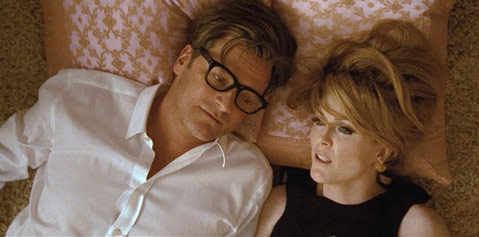A Single Man
Colin Firth and Julianne Moore star in a film written by Tom Ford, based on the novel by Christopher Isherwood, and directed by Ford.

Moods are unusually color-coded in A Single Man, to an almost bizarre degree. In his adaptation of the Christopher Isherwood novel about a potentially suicidal gay man robbed of his lust for life after his lover’s death, fashion designer-turned-film-director Tom Ford (and cinematographer Eduard Grau) rely on the kindness of filters to help tell the story. Colin Firth-in his strongest performance to date-is the single man in question here, seen in pale, bloodless form in his current depressed state. But blood returns to the cheeks in flashbacks with his lover and in one scene in a bar when a young student/lover-to-be suddenly appears, turning Firth’s face from pallid to flushed. And so it goes in this saga, where life and death wishes do a crazy, syncopated dance.
On one level, A Single Man plays like a variation on the theme of Iranian director Abbas Kiarostami’s classic Taste of Cherry, about a methodically suicidal man’s desperate yet determined effort to find reasons to keep on living. On another level, though, Ford’s film is happy to skate along on beautiful, if glum surfaces. While A Single Man has a certain and consistent mopey elegance going for it, the film also wallows in dry-cleaned melancholy, to a distracting degree, from architecture to the aura of suddenly hip early ’60s kitsch we recognize from TV’s Mad Men. Could A Single Man be the first film in history in which the leading man wears suits designed by the film’s very director?
In the end, the best reason to see A Single Man is for Firth and Julianne Moore, a marvelous, volatile, and engaging actress who has had precious few roles to sink her teeth into, and who is a joy to watch here. Part of the irritation here could be compared to the fallow ground of the supposed documentary on Chet Baker, Let’s Get Lost, in which director Bruce Weber, a famed fashion photographer by day, gets lost in the luster of surfaces and superficial impressions and forgets to pay respects to the subject. Ford makes Firth look real good, but loses sight of the narrative demands of the occasion along the way.



